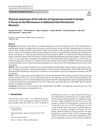 14 citations,
September 2015 in “Expert Opinion on Therapeutic Targets”
14 citations,
September 2015 in “Expert Opinion on Therapeutic Targets” The conclusion is that while oral contraceptive pills are effective for PCOS-related high androgen levels, new treatments with fewer side effects are needed.
 14 citations,
November 2014 in “European journal of medicinal chemistry”
14 citations,
November 2014 in “European journal of medicinal chemistry” Researchers found new potential treatments for conditions related to the androgen receptor, like male hormonal contraception, by testing thousands of compounds.
 12 citations,
April 1995 in “Journal of Medicinal Chemistry”
12 citations,
April 1995 in “Journal of Medicinal Chemistry” The new compounds moderately block a specific enzyme and strongly counteract a male hormone, suggesting potential for treating certain male-related health conditions.
 4 citations,
December 2017 in “PubMed”
4 citations,
December 2017 in “PubMed” Minoxidil may help treat hair loss by reducing the activity of a specific enzyme linked to baldness.
 1 citations,
October 2017 in “Elsevier eBooks”
1 citations,
October 2017 in “Elsevier eBooks” Antiandrogens can treat female hormonal conditions, but environmental ones may harm reproductive health.
 1 citations,
October 2010 in “Cambridge University Press eBooks”
1 citations,
October 2010 in “Cambridge University Press eBooks” Hormonal therapies are effective for managing hair and skin symptoms in women with PCOS.
December 2019 in “Orvostudományi Értesítö” Lifestyle changes, medications, and fertility treatments can improve PCOS symptoms and prevent complications.

Hormonal treatments can help with hair loss, acne, and excess hair growth, but it takes 3-6 months to see results and patients should know the possible side effects.
 January 2015 in “Вестник дерматологии и венерологии”
January 2015 in “Вестник дерматологии и венерологии” Some treatments like minoxidil, finasteride, and dutasteride are effective for hair loss, but there's no agreed best treatment.
 32 citations,
November 1996 in “International Journal of Dermatology”
32 citations,
November 1996 in “International Journal of Dermatology” Antiandrogens can help treat skin conditions like acne and excessive hair in women when used carefully.
 3 citations,
July 2011 in “Expert Review of Dermatology”
3 citations,
July 2011 in “Expert Review of Dermatology” Effective treatments for excessive hair growth in women include creams, laser therapy, and medications, with the choice depending on individual needs and potential side effects.
 November 1982 in “Inpharma”
November 1982 in “Inpharma” Spironolactone reduces hair growth in women with unexplained excessive hairiness.
 13 citations,
January 2014 in “Aesthetic Surgery Journal”
13 citations,
January 2014 in “Aesthetic Surgery Journal” Cyperus rotundus oil effectively reduces unwanted hair without side effects.
 March 2014 in “Medicina cutánea ibero-latino-americana”
March 2014 in “Medicina cutánea ibero-latino-americana” Melatonin applied to the scalp helps increase hair density in people with early hair loss.

Melatonin applied to the scalp helps treat early-stage hair loss in men and women.
 183 citations,
March 1982 in “JAMA”
183 citations,
March 1982 in “JAMA” Spironolactone is a safe and effective treatment for reducing excessive hair growth in women.
 80 citations,
January 1988 in “The Journal of clinical endocrinology and metabolism/Journal of clinical endocrinology & metabolism”
80 citations,
January 1988 in “The Journal of clinical endocrinology and metabolism/Journal of clinical endocrinology & metabolism” Spironolactone can cause side effects like irregular bleeding, but lower doses may reduce these effects and still improve hirsutism.
 64 citations,
January 1998 in “Drugs”
64 citations,
January 1998 in “Drugs” Dienogest combined with ethinylestradiol is a highly effective birth control that improves menstrual symptoms and has manageable side effects.
 49 citations,
April 2012 in “Phytotherapy Research”
49 citations,
April 2012 in “Phytotherapy Research” Rosemary leaf extract may be an effective natural treatment for hair growth and male pattern baldness.
 43 citations,
May 1986 in “Clinics in Endocrinology and Metabolism”
43 citations,
May 1986 in “Clinics in Endocrinology and Metabolism” Cyproterone acetate is effective for treating hirsutism and acne but less so for hair loss, with side effects similar to birth control pills.
 29 citations,
July 2012 in “Fertility and Sterility”
29 citations,
July 2012 in “Fertility and Sterility” Low and ultralow doses of flutamide can cause liver damage in young women with high androgen levels, regardless of dose or birth control use, with higher risk for those with higher BMI and liver enzyme levels before treatment.
 27 citations,
July 1982 in “British Journal of Dermatology”
27 citations,
July 1982 in “British Journal of Dermatology” The antiandrogen 11α-hydroxyprogesterone effectively reduces skin oil and cholesterol when applied to the skin.
 23 citations,
July 1993 in “Pharmacotherapy”
23 citations,
July 1993 in “Pharmacotherapy” Finasteride treats enlarged prostate and baldness, but may cause limited urinary improvement and sex-related side effects.
 11 citations,
December 2011 in “Revista Brasileira de Farmacognosia”
11 citations,
December 2011 in “Revista Brasileira de Farmacognosia” The seeds of Abrus precatorius, when processed, can prevent hair loss more effectively than common treatments.
 9 citations,
October 2017 in “Molecular Medicine Reports”
9 citations,
October 2017 in “Molecular Medicine Reports” Finasteride causes reduced tear flow and severe eye inflammation.
 8 citations,
August 2020 in “Clinical and Experimental Dermatology”
8 citations,
August 2020 in “Clinical and Experimental Dermatology” Spironolactone is a low-cost, effective, and generally safe treatment for various skin conditions related to hormones.
 8 citations,
January 2020 in “Skin appendage disorders”
8 citations,
January 2020 in “Skin appendage disorders” Saw palmetto supplements may modestly improve hair regrowth with few side effects, but more research is needed.
 January 2024 in “Pharmaceutical medicine”
January 2024 in “Pharmaceutical medicine” Most European physicians know the risks and safe use of Cyproterone acetate, but few remember receiving official safety communications.
 October 2010 in “Reproductive Biomedicine Online”
October 2010 in “Reproductive Biomedicine Online” Women with PCOS and androgenic alopecia have different triglyceride metabolism compared to those without hair loss.
 October 2010 in “Reproductive Biomedicine Online”
October 2010 in “Reproductive Biomedicine Online” Women with pituitary adenomas often have reproductive issues, like irregular periods and trouble getting pregnant, but not always breast milk production without pregnancy.





























